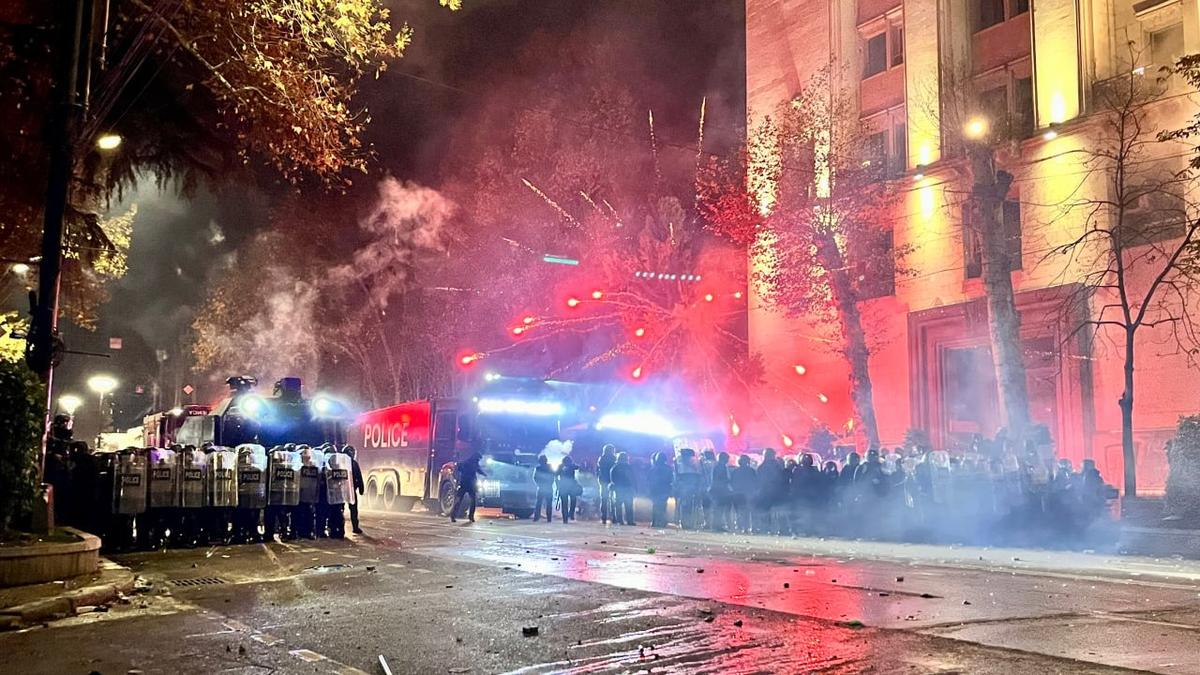Saba Kevkhishvili lies on a hospital bed with his eyes swollen shut, ringed by dark purple bruises that bear the imprint of the violence he endured at the hands of those paid to protect him.
“The policemen threw me into a minibus, where about six special forces guys started beating me mercilessly,” the 33-year-old real estate agent said. “They hit me in the head, threatened to rape me with a baton, cursed at me and humiliated me.”
Kevkhishvili is among the hundreds who have been brutally beaten by police in the Georgian capital Tbilisi over the past three weeks, when protests broke out against the ruling Georgian Dream party’s announcement that it would suspend EU accession talks, despite the country’s constitutional commitment to joining the bloc, an objective that has the support of over 80% of Georgians. That decision has been perceived as a profound betrayal, even by some Georgian Dream supporters.
Parting from the crowd in the early hours of 2 December, Kevkhishvili cautiously approached the police cordon, with his arms outstretched and waving a Georgian flag to indicate his peaceful intent.
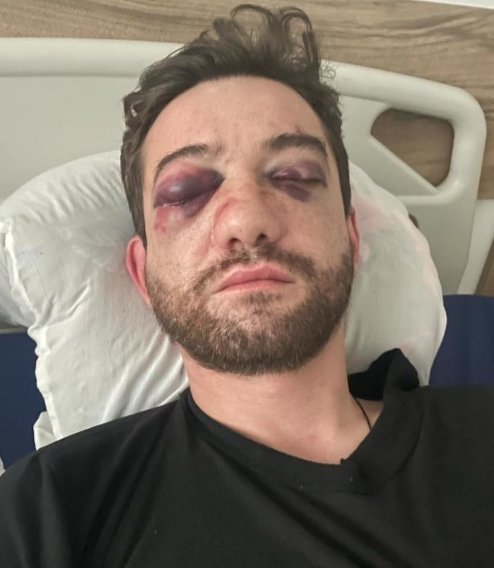
Saba Kevkhishvili lying on a hospital bed. Photo: Saba Kevkhishvili
“I told them that I wasn’t doing anything wrong and was simply engaging in a peaceful protest against what was happening in the country,” he told Novaya Gazeta Europe.
A senior police officer who spoke with Kevkhishvili asked him why he was protesting, to which he responded by showing the officer a video in which another protester, Zviad Maisashvili, was viciously kicked in the head by police officers as he lay on the ground. The officer replied by noting that police officers had also been injured during the recent protests.
Despite their disagreement on whether the police response to the protests was justified, Kevkhishvili said he then told the officer “that this country was ours to build, both mine and his,” though he added that such brazen violence on the part of the authorities was indefensible.
Moments later, Kevkhishvili was dragged behind the cordon by police officers and then taken away. After the beatings he suffered in the minibus, which, according to Kevkhishvili, lasted around 10 to 15 minutes, he was taken by ambulance to a local hospital. There, he found himself lying on a bed next to Maisashvili, the very man whose beating he had just shown to the police.
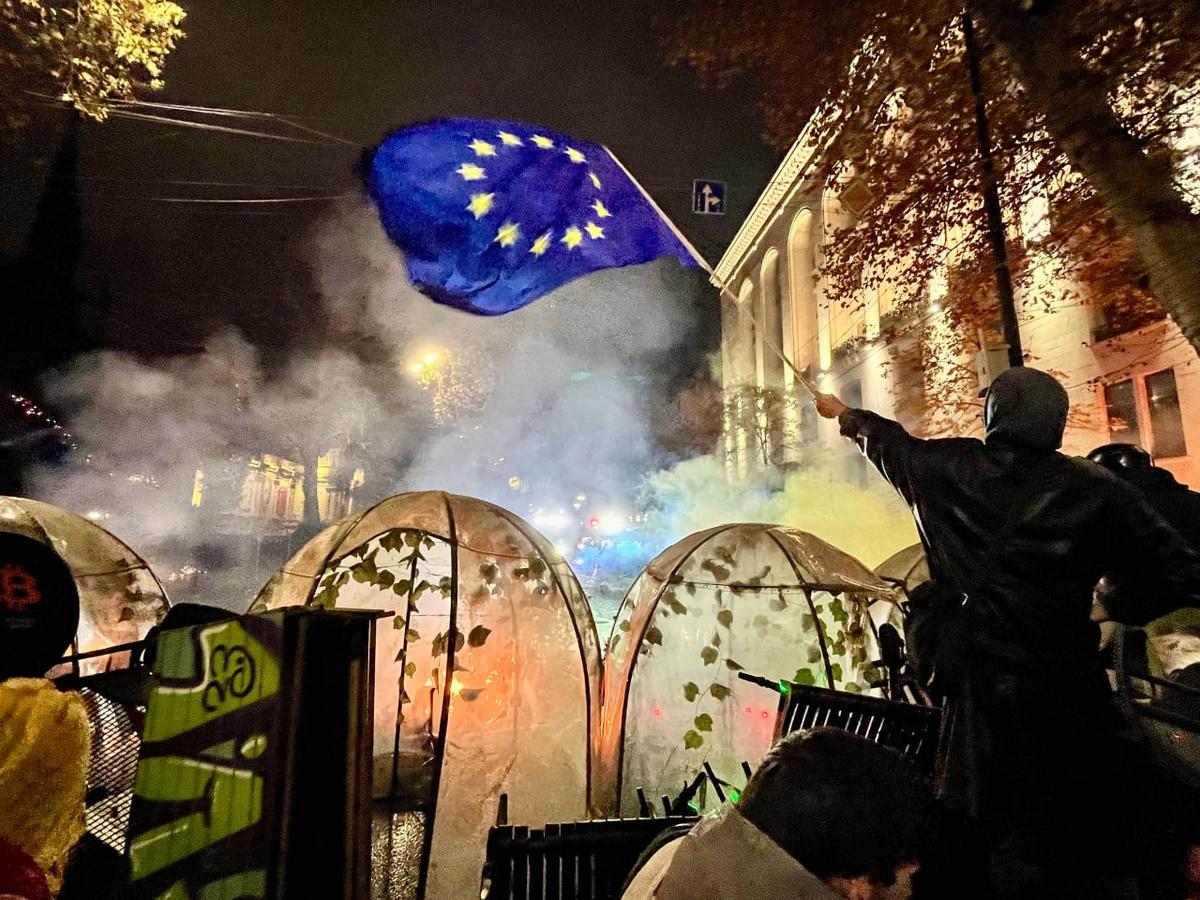
A protester waves a EU flag from behind the barricade in Tbilisi on 30 November. Photo: Nicholas Pearce for Novaya Gazeta Europe
‘New stage of police terror’
Since the protests began in late November, at least 460 people have been arrested and over 300 have reported being beaten by police, according to local anti-corruption watchdog Transparency International Georgia. Journalists in particular have been targeted by law enforcement officers and government-aligned masked thugs commonly known as “titushky”, a term with roots in the Yanukovych regime’s deadly crackdown on Ukraine’s Euromaidan protesters in 2014.
The Georgian Young Lawyers Association (GYLA), a human rights organisation founded in 1994, has condemned the “illegal and disproportionate” use of crowd dispersal techniques , including tear gas, water cannons and pepper spray, describing the situation in Georgia as a “new stage of police terror”.
Since the protests began in late November, at least 460 people have been arrested and over 300 have reported being beaten by police.
Stories of some of the most egregious beatings and arrests have spread across social media, energising the simmering but sporadic protests that have been taking place in Tbilisi since October’s parliamentary election, in which Georgian Dream claimed victory amid widespread reports of vote-buying, ballot-stuffing and street violence.
Being hearing impaired, 24-year-old Davit Abuladze was unaware as he walked home one night that three riot police officers were approaching him, who reportedly ambushed him, beat him and took his belongings. Vato Bzhalava, a researcher at a local pro-democracy think tank, was grabbed off the street by riot police while walking his dog, which they simply left tied to a tree. In one video that was shared on social media, a mother is seen falling to her knees, pleading desperately with police officers not to take her epileptic 19-year-old son away, who, according to his uncle, was severely beaten in police custody.
“In Georgia we’ve had problems with excessive use of force by police but nothing compared to this.”
“In Georgia we’ve had problems with excessive use of force by police but nothing compared to this,” the former secretary of Georgia’s National Security Council and the current leader of the opposition Federalists party Giga Bokeria told Novaya Europe, adding that “law enforcement and criminal groups are working together to brutally beat journalists, activists and opponents”.
Echoing those sentiments, Georgian political analyst Ghia Nodia compared the current crackdown to the violent dispersals of protesters ordered by former president Mikheil Saakashvili’s United National Movement in 2011, events he described as a “shameful stain” on the party’s reputation, while noting that they were nevertheless isolated incidents, whereas Georgians today faced “a long and systematic campaign of impeachable violence and cruelty with no end in sight”.
Rather than deterring protesters, the incidents of police brutality have only fuelled the demonstrations, leading to crowds of up to 200,000 people gathering nightly on Rustaveli Avenue, the capital’s main street.
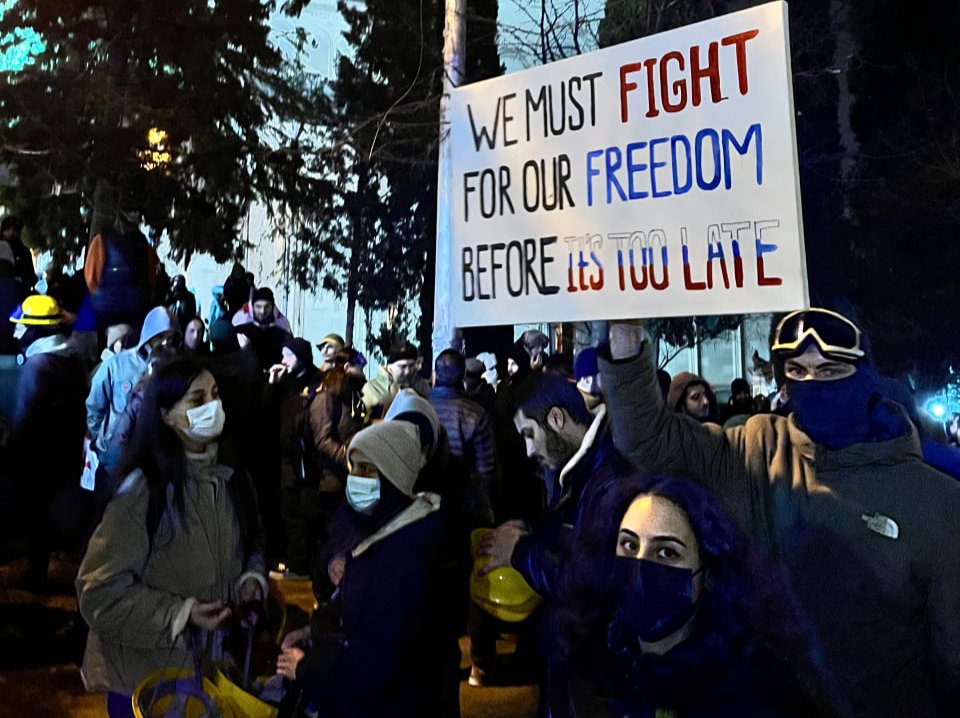
A protester holds up a sign in Tbilisi on 30 November. Photo: Nicholas Pearce for Novaya Gazeta Europe
From street to legislature
Amid a lull in the violence last week, Georgian Dream began rushing through legislative amendments designed to expand police powers while simultaneously making it harder for demonstrators to mount fresh protests.
Georgia’s parliament, currently attended solely by Georgian Dream deputies since opposition parties announced they would boycott the chamber in protest at the disputed election results, passed a law last week banning the wearing of masks by members of the public, as well as the use of fireworks and lasers, both of which have been used by protestors against riot police.
“Gang members will have police IDs and whatever they do, they will be able to tell people ‘we’re policemen, don’t touch us’.”
Another law, set to come into effect on 1 January, will allow the Interior Ministry to recruit law enforcement officers directly, abolishing the current requirement for a competitive selection process to be held, a move that will mean titushky can be hired to bolster dwindling police numbers, according to Giorgi Baramidze, a former Interior Minister under the previous United National Movement government.
“Gang members will have police IDs and whatever they do, they will be able to tell people ‘we’re policemen, don’t touch us’,” Baramidze told Novaya Gazeta Europe.
Georgian Dream also announced plans to amend civil service laws, which will make it easier to fire government critics, following multiple petitions from over 200 civil servants denouncing the government’s withdrawal from the EU accession process and its disproportionate use of force against protesters.
In response to the petitions, Prime Minister Irakli Kobakhidze described the civil service as undergoing a process of “self-cleansing”, while Mamuka Mdinaradze, leader of Georgian Dream’s parliamentary faction, claimed the new amendments would “ensure the revitalisation of the public sector”.
Of the recent changes, one initiative in particular appears to back up the popular accusation that Georgia’s government is acting in an “Orwellian” manner: a proposal to expand police powers to detain individuals on suspicion of future misconduct, even if no offence has been committed.
“These are all signs that [Georgian Dream] feels that the protests are a serious problem for them, both due to their scale and potential to recur,” Bokeria said, describing the legislative changes as part of a broader effort to suppress civil society.
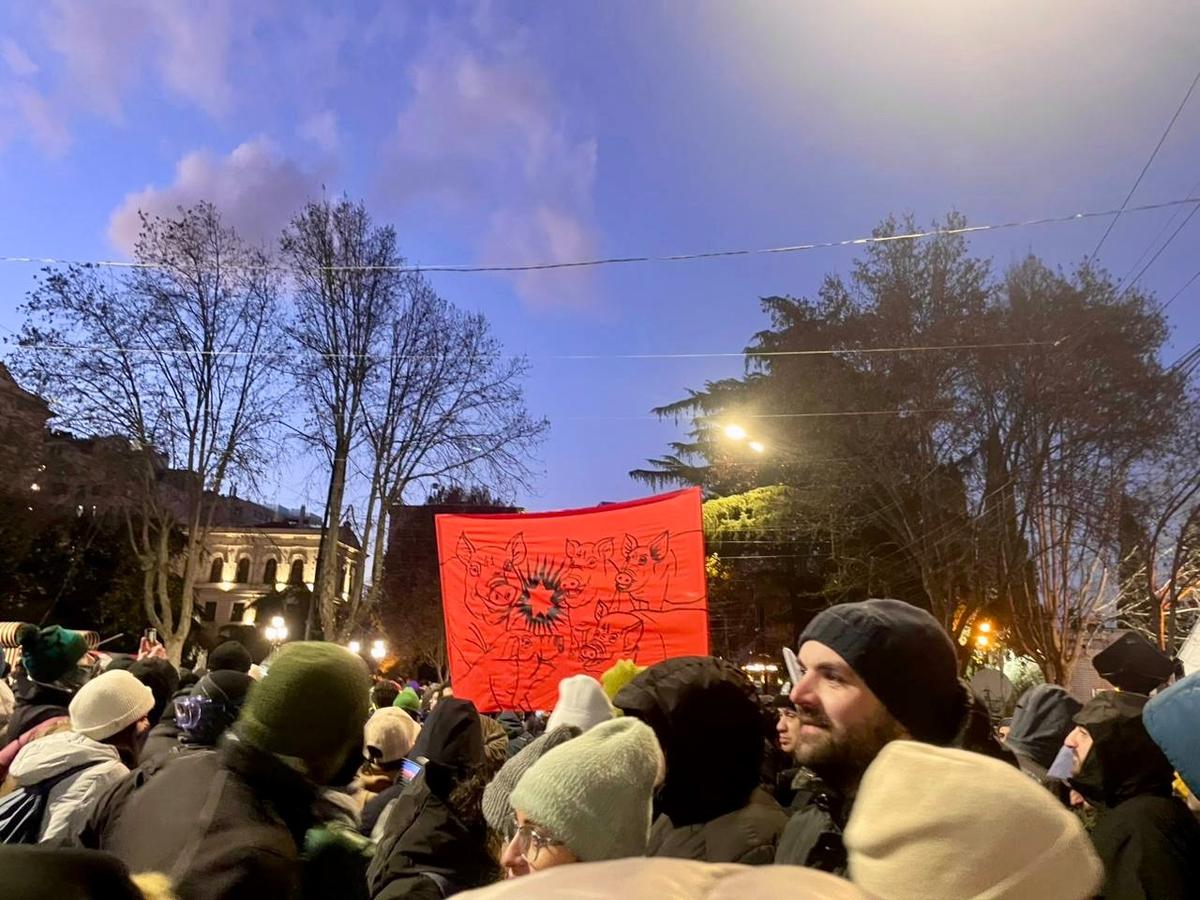
Protesters hold up a sign depicting Georgian Dream politicians as the pigs from George Orwell’s Animal Farm, in Tbilisi on 14 December. The pigs have the number 41 on them, Georgian Dream’s number on the electoral list. Photo: Khatia Pochkhidze
Shift to a police state
The unprecedented level of police violence, combined with Georgian Dream’s rush to amend policing laws, have led some to suggest that Georgia is already well on its way to becoming a police state.
“On an almost daily basis the ruling party is moving closer to the model of a repressive state, where citizens’ fundamental rights are violated and the rule of law is replaced by the law of rulers,” Kornely Kakachia, who heads the Georgian Institute for Politics think tank, told Novaya Gazeta Europe.
During a march against police violence on 9 December, Georgian artists, including several well-known actors, delivered a similar message. Actor Davit Beshitaishvili, who is best known for his role in the hugely popular Georgian TV series My Wife’s Girlfriends, said that “those calling themselves the Georgian government nowadays are nothing but high-ranking criminals”.
“With everything that’s happening, I have forgotten that I’m even an actor, I’m just one among my fellow citizens standing up to defend the interests of my country,” Beshitaishvili added.
Many protesters are particularly furious that no police officers have yet been held accountable for the acts of violence committed since the protests began and have mounted fresh demonstrations calling for the release of those who remain in police custody, at which they chant “the police are everywhere, but justice is nowhere to be found.”
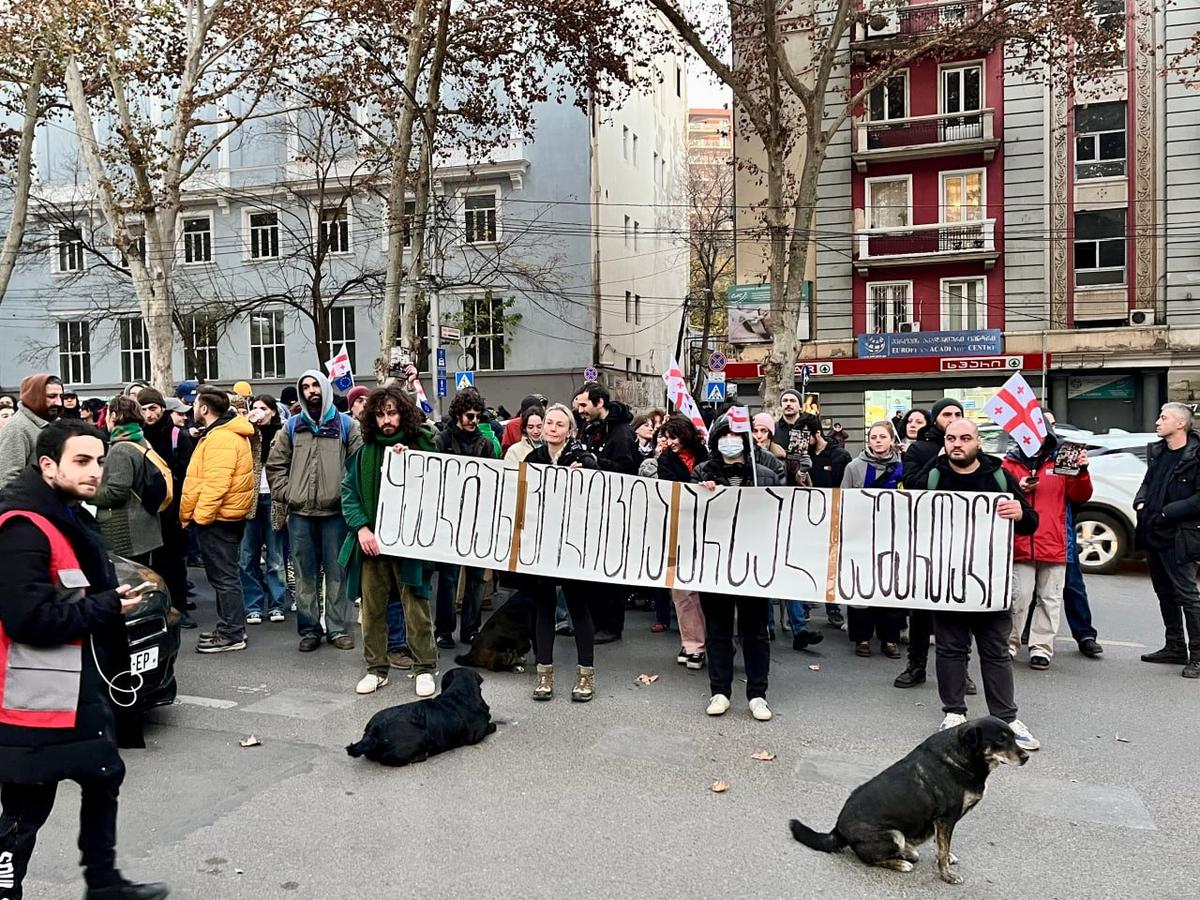
Members of Tbilisi’s artistic community protest against police violence on 9 December. The sign reads, “Police are everywhere, but justice is nowhere to be found”. Photo: Nicholas Pearce for Novaya Gazeta Europe
That sentiment was vividly captured on Saturday when a Christmas tree outside parliament that was due to be lit for the first time that evening had to be surrounded by a phalanx of police officers. The lighting ceremony was ultimately postponed by Tbilisi’s Georgian Dream Mayor Kakha Kaladze, who blamed his decision on “provocations” from the “radical opposition”.
Georgian President Salome Zourabichvili, whose term is due to end when her successor Mikhail Kavelashvili is inaugurated on 29 December, has increasingly become a figurehead for the protest movement, even attending several rallies in person. Zourabichvili recently described the Christmas tree as a “symbol of the police state which Georgian Dream is trying to turn Georgia into”.
“Their goal is to intimidate us, but it won’t work. Georgia and its people have been through worse.”
On Saturday, an electoral college controlled by ruling party loyalists voted to appoint Kavelashvili, a far-right former footballer and fervent critic of the West, as Georgia’s next president, the first time Georgia’s head of state has been chosen by elected officials rather than popular vote.
Zourabichvili has called her successor’s appointment a “parody” and has pledged to remain in her post, potentially setting the stage for another violent confrontation between police and protesters in the new year.
Despite only recently being discharged from hospital, Saba Kevkhishvili has already begun attending anti-government protests again, as temperatures in Tbilisi plummet below freezing.
“I returned to the rallies and will keep showing up until we win,” Kevkhishvili told Novaya Europe. “Their goal is to intimidate us, but it won’t work. Georgia and its people have been through worse.”
Join us in rebuilding Novaya Gazeta Europe
The Russian government has banned independent media. We were forced to leave our country in order to keep doing our job, telling our readers about what is going on Russia, Ukraine and Europe.
We will continue fighting against warfare and dictatorship. We believe that freedom of speech is the most efficient antidote against tyranny. Support us financially to help us fight for peace and freedom.
By clicking the Support button, you agree to the processing of your personal data.
To cancel a regular donation, please write to [email protected]
